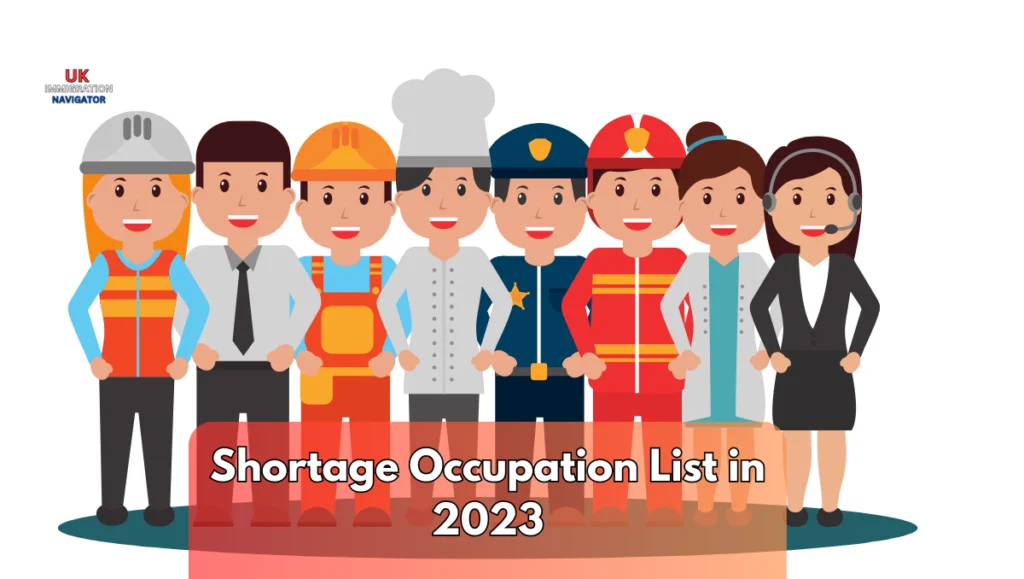Introduction
Welcome to the UK Immigration Navigator! In 2024, one of the essential aspects of the UK’s immigration policies is the Shortage Occupation List (SOL). As your host, I will guide you through the details of this list, which plays a vital role in addressing the workforce demands of the United Kingdom. The SOL helps identify occupations facing skill shortages, allowing the country to attract skilled workers from around the world. Let’s delve into the significance of the Shortage Occupation List in 2024 and understand its impact on the UK’s labor market.
Table of Contents
Check out our other post:
UK skilled visa 2023 procedure.
Overview of UK Shortage Occupation List in 2024 (SOL)
The Shortage Occupation List in 2023 is a key tool for the UK government to recognize professions suffering from a significant scarcity of skilled workers. As your UK Immigration Navigator, I will explain how the SOL streamlines the process of hiring skilled workers from outside the European Union (EU) and European Economic Area (EEA) to meet the country’s labor demands. This list undergoes regular reviews and updates to adapt to changing job market needs and economic dynamics.
list of Registered licensed sponsors: official website.
Categories in the UK Shortage Occupation List in 2024
As we explore the Shortage Occupation List, we’ll discover that it covers a diverse array of sectors and industries, each with unique eligibility criteria. Our journey will take us through different fields such as healthcare, technology, engineering, education, hospitality, and more. Let’s navigate through the specific occupations listed in each sector and understand their importance in filling the skill gaps within the UK job market.
Healthcare Sector
The healthcare sector occupies a prominent place in the Shortage Occupation List. With an aging population and a growing need for specialized medical services, the demand for skilled doctors, nurses, and healthcare professionals remains high. As your UK Immigration Navigator, I’ll highlight how the SOL enables the UK to recruit talented medical personnel from across the globe, ensuring its healthcare system’s continued quality and efficiency.
Technology and Engineering
In the dynamic world of technology and engineering, skilled professionals are in high demand. Our journey through the Shortage Occupation List will uncover positions such as software developers, data analysts, and experts in artificial intelligence, all of which play crucial roles in driving innovation. As we navigate through this sector, we’ll see how the SOL fosters technological advancements by bridging the skill gap through global talent.
Education and Academia
As we explore the education sector on the Shortage Occupation List, we’ll find that universities and educational institutions are continuously seeking foreign educators and researchers to enrich their academic programs and contribute to cutting-edge research. I, as your UK Immigration Navigator, will guide you through the importance of attracting talent from abroad to sustain the UK’s reputation as a global hub for higher education.
Hospitality and Tourism

Our journey would be incomplete without exploring the hospitality and tourism sector on the Shortage Occupation List. With job roles like chefs, restaurant managers, and hotel staff listed, we’ll see how this sector contributes significantly to the UK economy. I’ll help you understand how the SOL ensures a steady supply of skilled workers to maintain excellent service standards and cater to the diverse needs of tourists and locals.
The Impact of the SOL on Immigration Policies
As your UK Immigration Navigator, I’ll highlight the direct influence of the Shortage Occupation List on the UK’s immigration policies. Occupations listed in the SOL receive preferential treatment when it comes to work visas and permits. Skilled workers seeking job opportunities in listed occupations find it easier to obtain work visas, benefiting both them and UK employers who gain access to a broader talent pool.

Advantages and Disadvantages of the SOL
As we navigate through the Shortage Occupation List, we’ll explore its advantages and disadvantages to gain a comprehensive understanding.
Advantages
- Filling Critical Skill Gaps: The SOL addresses labor shortages in key sectors, ensuring vital services and industries receive the expertise they require.
- Promoting Economic Growth: By attracting skilled workers, the UK fosters economic growth and innovation in various sectors.
- Cultural Diversity: Recruiting talent from different countries enriches the UK’s cultural landscape and promotes global understanding.
Disadvantages
- Potential Displacement of Local Workers: Some argue that hiring foreign talent might lead to the displacement of local workers in certain industries.
- Dependency on Global Talent: Overreliance on foreign workers might hinder investments in training and development of local talent.
- Visa and Immigration Challenges: The immigration process can be complex, and administrative delays may occur.
Conclusion
As your UK Immigration Navigator, I have guided you through the significance of the Shortage Occupation List in 2024. We have explored how the SOL plays a pivotal role in addressing workforce demands, promoting economic growth, and maintaining essential services. As you continue to navigate the UK’s immigration landscape, remember the importance of striking a balance between recruiting foreign talent and nurturing the skills of the domestic workforce.



